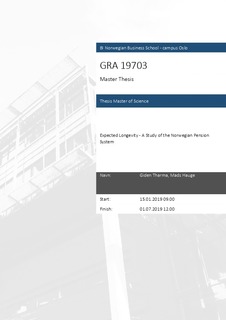| dc.description.abstract | The growing concern about the increasing age wave caused the Norwegian
government to change their pension system in 2011, into a more flexible pension
system. One of the reasons for this is the increase in expected longevity for every
birth cohort. This paper examines how the claiming behaviour is affected by
individuals’ expected longevity after the implementation of the new pension system
in Norway. The results reveal that having a higher expected longevity causes
individuals to delay their pension claiming. However, we find no evidence that
individuals will act on the knowledge about their own expected longevity in
choosing when to claim pensions. Moreover, we find evidence that different
socioeconomic and demographic variables cause individuals to act differently in
choosing when to claim pensions. Lastly, we find that labour market participation,
among those aged 62, has improved after the new pension system was introduced,
creating a more mature labour force. | nb_NO |
